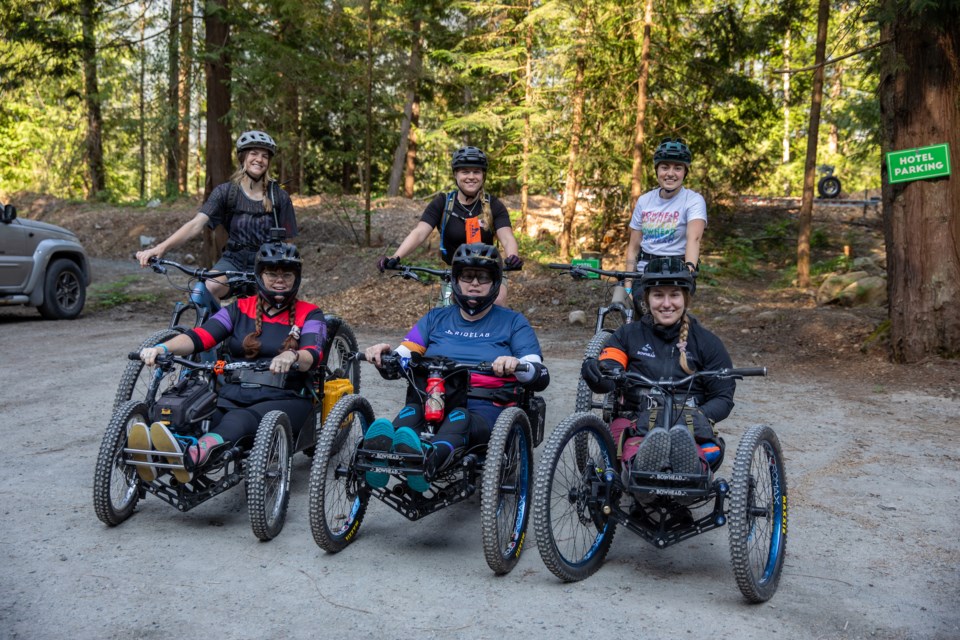Six riders on unique mountain bikes will soon be hitting local trails at the
The event for female-identifying, non-binary, transgender and queer riders runs from May 13 to 17.
For the second year, riders will be there.
Last year, the group brought two riders to the festival on bikes tailored to their particular disabilities. This year, six riders will be in the cohort.
Local Sierra McCann, who founded Squamish Adaptive Mountain Biking as a passion project, says that adaptive bikes have opened up options for riders who face physical challenges on typical mountain bikes.
"When it comes to actual outdoor experiences that are a bit more rugged, and in the backcountry, there's huge limitations. So, adaptive mountain bikes are opening up this whole outdoor adventure possibility," McCann said.
She noted that the bikes are expensive because they are very customized, climbing to the $30,000 mark.
"You're making something that's so technologically advanced," she explained.
McCann said Squamish Adaptive Mountain Biking isn't a charity or a non-profit. She notes that she just really loves mountain biking and connecting people. She is volunteering her time and effort to get as many people who face barriers onto local trails as possible.
“My goal is to support people with the lived experience of disabilities in leading these events in these roles—in the guiding and the coaching—because they know best and they create the most safe, comfortable space, and I'm there to just facilitate that,” she said.
The group fundraised to bring the six riders to the festival.
She noted that there are a lot of expenses that come with bringing riders to the festival that some may not consider.
There's booking accommodations that are accessible, and transporting the adaptable bikes to Squamish is tricky.
"It's really hard to transport up to Squamish, especially when you're bringing a massive mountain bike and you're in a wheelchair. Getting on buses or public transit is not a great option. So we have our own airport pickups, we have our own shuttles for their bikes. And then we have our own, separate medical equipment that we'll bring in and set up in our hotels."
A lot of the people the group is taking out this year to the festival have their own bikes, but lots of people reach out and want to participate, but can't because they don't have an adaptive bike, she said.
"Ideally, having bikes available would be amazing, but it's a big obstacle," McCann said.
What are the bikes like?
Everyone is different and each bike can be modified to meet the needs of the rider, she noted.
"A lot of the people that we ride with, they have spinal cord injuries, and they're on a three-wheeled style bike," she said.
"They're full suspension. The Bowhead [bike] is one that we see a lot of—they have an articulating front. They have a lot of power to them, so you can actually climb or keep the speed on single track."
She stressed that there are various types of bikes and modifications that can be made—some also come in cool colours, she said with a laugh.
"Like a hot pink girl's bike, and it looks really good."
Sharing accessibility knowledge
She said mountain bike riders who use accessible bikes are a pretty tight-knit community, and there is an underground sharing of knowledge about local trails regarding accessibility.
"It's kind of like a black market list of trails that are really good to try or ones that have tricky parts, but if you go with a friend you can ride."
The dream would be to have a site with all the information for each trail, as there is for able-bodied riders.
How locals can help
McCann hopes that the group can continue to raise funds and awareness about adaptive riding in Squamish.
She credits many businesses in Squamish for stepping forward to help with getting the six riders to this year's upcoming festival.
"It was wild, I did not expect as many people to be like, 'I know about adaptive mountain biking, and I think it's awesome. ... How can we support you? '"
She said some offered to sponsor riders, or gave gear for a raffle.
"So, financially, we got to reduce some of those extra expenses that were preventing some of the women from feeling like they could attend," she said.
She noted that the group receives grants and that Tourism Squamish has reached out to sponsor a rider at the festival.
Officials at Tourism Squamish also want to learn and share through the organization's channels what Squamish is like for people with disabilities, according to McCann.
In terms of awareness, McCann, who is able-bodied herself, said it would be great if more locals could think about the barriers they perhaps didn't notice before and consider how to mitigate them. If they are building a bridge on a trail, for example, is it wide enough for a wheelchair or adaptive mountain bike?
"It's also acknowledging in public spaces, as well as in the mountain biking space, where accessibility or life barriers exist," she said. "I think it's really important that people who are able-bodied also advocate for that group to be able to access the outdoors."
She said she knows for herself how important and enjoyable the outdoors and mountain biking are here in the Sea to Sky Corridor.
She feels this is the same for everyone, and so should be accessible for all.
Find out more about the group by following its Instagram account, .
Find out more about on its website.





